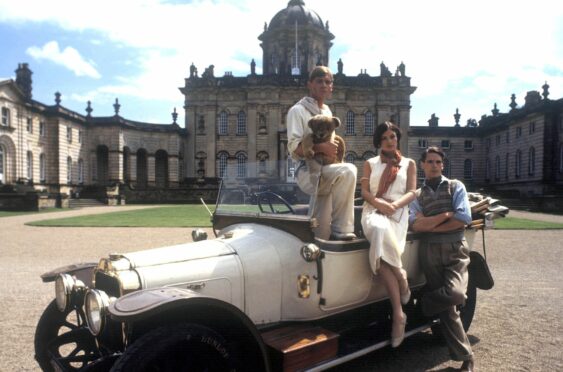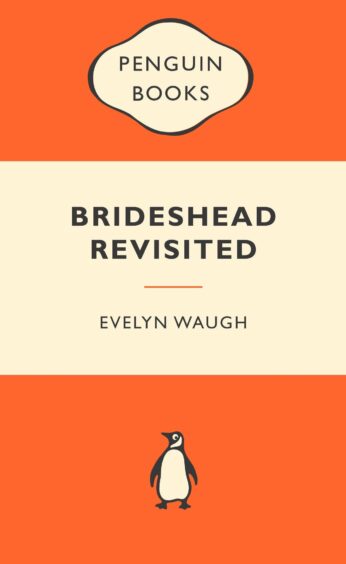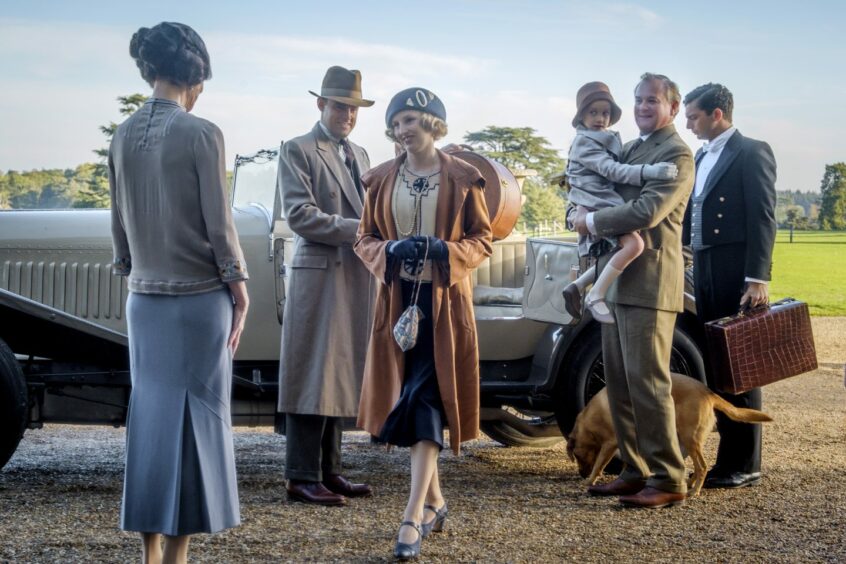
The autumn of 1981 was exceptionally cold. Our politics mean, fraught and at times delusional, as the frost bit and the economy tanked.
But from mid-October there aired, weekly, a TV drama of pitch-perfect casting and peerless beauty. And, 40 years on, many who watched it believe Granada TV’s production of Evelyn Waugh’s Brideshead Revisited can never be equalled.
It made global stars of Jeremy Irons and Anthony Andrews, and won eight Baftas, an Emmy and a Golden Globe. “The best series ever seen on US television,” panted the Washington Post. Another American publication hailed it “the biggest British invasion since the Beatles.”
“I think it is the best piece of fictional TV ever made,” declared author Anthony Burgess. “It is the book. In some ways, it is better than the book.” And, in 2015, the Daily Telegraph pronounced: “Brideshead Revisited is television’s greatest literary adaptation, bar none. It’s utterly faithful to Evelyn Waugh’s novel yet it’s somehow more than that, too.”
More than two years in the making and plagued by problems, many involved in the making of the show had feared disaster. But they had crafted a masterpiece, and one of enduring legacy. Without Brideshead, we would never have enjoyed such lush Merchant-Ivory productions as A Room With A View.
There would certainly have been no Downton Abbey. And Brideshead Revisited daunts anyone tempted to remake it. A 2008 film – with a miscast Ben Whishaw – was a critical and commercial failure. And a BBC-helmed production in the works – directed by Luca Guadagnino, of Call Me By Your Name fame – arouses foreboding.
We forget how shonky most British television was, back in the ’70s. The schedules depended heavily on imports – mostly from America. Productions were studio-bound and formulaic. ITV, in particular, leaned heavily on soaps, game shows and sitcoms. When the BBC, in 1976, scored a striking success with I, Claudius, it squandered millions, in the years following, trying to repeat the formula, each new costume drama worse than the last.
Meanwhile, while no one was looking, Granada TV overtook the Beeb with the majesty that was Brideshead Revisited: how timid, middle-class Charles Ryder falls in love with a noble family and their very way of life, even as their past destroys them and their present corrupts him.
It was a daunting project. Evelyn Waugh’s novel includes scenes in Oxford, Venice, Morocco and an ocean-going liner. There are such huge set-pieces as a grand Mayfair ball and a Boxing Day hunt. Though never quite explicit, there is a strong homoerotic current in the early chapters.
And – especially in the finale – Brideshead Revisited is a deeply religious book, almost all the characters undergoing some sort of conversion. The show was going to be expensive to make and, in an era dominated by coarse, gritty, contemporary urban drama, would the public really want this fey period-piece?
Michael Lindsay-Hogg has never forgotten the day, in the high summer of 1978, when Derek Granger asked him round for a drink. “Look,” he said, “Evelyn Waugh. Brideshead Revisited. Have you ever read it?…Well, the thing is, Granada’s going to do it for television. I’m producing. Do you want to direct it?”
There followed eight months of casting, costuming, and wrestling with a central problem – a script commissioned at no small cost from John Mortimer.
It was, they feared, too flip, too thin and, bravely, they binned it. Granger and his team returned to the novel, mining it wholesale – 95% of all the dialogue in the drama is by Evelyn Waugh. Yet Mortimer kept the fee, the screen-credit, and was even nominated for an Emmy.
Then, in August 1979, Jeremy Irons – who, as Charles Ryder, appears in almost every scene – was whipped away to make The French Lieutenant’s Woman, even as technical unions went on strike and effectively shut down ITV till the end of October. Granger’s shooting schedule, with all principal photography to be in the can by New Year 1980, was blown apart.
Worse, Lindsay-Hogg – who, as the director of Beatles documentary Let It Be can be seen in Peter Jackson’s revelatory Fab Four series Get Back – was contracted to direct a film in the spring of 1980. There was no way out of it and, gutted, he had to walk away from Brideshead. To widespread alarm, the mantle fell on Charles Sturridge. He was tireless, charming and had most original ideas – but the new director was only 28 and had never shot anything more demanding than a few episodes of Crown Court and Coronation Street.
“My God, it’s a schoolboy,” gasped Nickolas Grace, who plays the affected and stuttering Anthony Blanche.
“Don’t worry,” Jeremy Irons assured Phoebe Nicholls, cast as Cordelia. “If he’s not what he’s cracked up to be, we’ll just get rid of him.”
“The actors thought I was part of an insurance scam,” Sturridge later, ruefully remarked, “and my inexperience would cause the production to fall through.”
But he won their confidence – and, as for Phoebe Nicholls, in 1985 she married him. Their son, Tom Sturridge, is a noted actor. As it turned out, there was blessing in this hiatus. For one, Granger finally convinced Granada chief executive David Plowright that six hours of screen time could never do justice to the novel. His boss took the gamble: the drama was extended to 12 hours and with a budget to match.
Still more sensationally, the hold-up made both John Gielgud and Lawrence Olivier available for the roles of Charles Ryder’s maddening father and the disgraced, dying Earl of Marchmain.
Though they would share no scenes, it was their first appearance on the same bill since 1935 – and, as it proved, Olivier’s last great screen performance, quite dominating the last episode even from “the Queen’s bed, in the Chinese drawing room.”
With Diana Quick, Claire Bloom, Jane Asher, John Le Mesurier as a world-weary priest, Charles Keating as the amoral Rex Mottram MP and John Grillo as the slimy Mr Samgrass, the casting overall was stellar. But there were two other vital players. The first was Castle Howard, as Brideshead itself – with its dome and Atlas fountain, its lawns and terraces and galleries. And, second, Geoffrey Burgon’s ethereal soundtrack, dominated by bassoons and horns and a lonely trumpet, all sweetness and melancholy.
And Charles Sturridge made the boldest decision of all: that Irons would relate much of the tale, in Waugh’s own words, in haunted voiceover. It is this that elevates Brideshead Revisited to the sublime, and why it bears repeated viewing over many years – not least as, the older you grow, the more you can wistfully relate to it.

Fidelity to the novel also, inevitably, meant living with its flaws. The loveliest character of all, Anthony Andrews’ Sebastian Flyte – with his teddy bear and linen suits and elfin beauty – disappears halfway through the story and is never seen again.
Ryder’s subsequent romance with Sebastian’s sister Julia (Diana Quick) never has the resonance of that with her brother. And the Catholicism – especially in an extraordinary starlit scene by the Brideshead fountain, as Julia’s guilt overwhelms her – does verge on the preachy, though Quick quite nails that distraught monologue. What should have been a mere eight months took two long years. And, as editor Anthony Ham has related, of the half a million feet of film shot, only 26,000 was broadcast. But at last, on October 12, 1981, the first episode could air.
And we loved it. “The nearest thing to perfect in the entire history of television series,” sang the Financial Times. “A triumph of beauty, fidelity and relevant embellishment – in short, a hit,” said Michael Ratcliffe in The Times, singling out Burgon’s score for special praise.
Words like “lavish”, “luminous”, “splendid”, “sumptuous” and “glorious” were hurled about like confetti. And Nancy Banks-Smith, in The Guardian, was in ecstasy.
This was “a book of great splendour, splendidly done…one of those occasions when you would like to taste and smell television: the plovers’ eggs, the single peach for luncheon, the ripe white raspberries and the room packed with daffodils. It makes you greedy. I would like to watch the whole thing in one disgusting, 12-hour gulp.”
And, as the New York Times observed 30 years later, Brideshead Revisited “proved that people will watch 659 very slow minutes of a costume drama if it is sumptuous enough”.
Not everyone enthused. Kingsley Amis resented all the praise for deft direction and clever camera-angles. “From the way some of them go on, you would think the camera-team had had a hand in building Christ Church or St Mark’s instead of just pointing their instrument in approximately the right direction and remembering to take the cap off the snout.” Richard Ingrams thought it too slow, too languid, and disliked Burgon’s music.
But, generally, all rejoiced – and that was as nothing to the hysteria when Brideshead Revisited was broadcast in America. Young men began toting teddy bears to college. Bloomingdales gave over entire windows to Brideshead fashion. Panama hats, Argyle sweaters, silk cravats and linen jackets flew off the shelves on both sides of the Atlantic.
To this day, Anthony Andrews still has fan mail telling him all about their latest Brideshead-themed party – “it’s strangely comforting.”
And Nickolas Grace even heard of an Anthony Blanche fan club in Toronto – gathering every month in purple smoking jackets, to varnish their nails purple and sound decadent.
“I said, ‘My God, what have I done to these people?’” Grace recalls. “People would come up to me in the street and say, ‘Just say B-b-brandy, Alexander…’”
Brideshead Revisited struck such a chord with Americans because it was so quintessentially English. But it particularly resonated in Britain because of its pitch-perfect portrayal of a past and gracious way of life – the immaculate dress, the perfect manners, the delicious food and drink, the stately homes and classic cars.
There will always, too, be that healthy British appetite for folk more fortunate than ourselves getting it in the neck.
But not everyone likes the story and some daft assertions have been made – that, for instance, Brideshead Revisited legitimised a sort of loadsamoney, prole-scorning Thatcherism.
That cannot account for its enduring appeal – Waugh’s novel still sells by the thousand every year – and, in any event, it was arrivistes like Norman Tebbit, Cecil Parkinson and Michael Forsyth who were closest to Margaret Thacher’s heart, not languid aristocrats.
And Sergio Angelini’s verdict is sillier still. “With its sterling literary and acting credentials, glossy surface sheen and rose-tinted view of the past, Brideshead Revisited’s success led to a string of similarly nostalgic film and television productions that went hand in hand with the backward-looking world view propounded by the Thatcher and Major governments.”
Really? Those years also begot Heart Of Darkness, A Very British Coup, Auf Wiedersehen, Pet and The Boys From The Blackstuff – hardly cosy country-house fare.
And Downton Abbey is exactly what Brideshead is not. Things happen to Downton Abbey characters, from the ludicrous to the unbelievable. It is soapy, unchallenging fare, in no way driven by internal conflict – the profound power of religion, the dark undercurrents of sexuality, the deep forces between men and women.
Brideshead Revisited, Michael Lindsay-Hogg concludes, is “concerned not with costumed nostalgia or cliff-hangers or audience-grabbing surprises but with how life changes, how the dreams of youth alter and, in time, become a sterner reality.”
Charles Sturridge looks back gratefully. “The combination of Granada’s stubbornness, Derek’s confidence, a brilliant cast and my own unlikely mix of innocence and experience allowed something rarer. We got to make exactly what we thought.”
But, really, “what distinguishes Brideshead is its sensitive ability to translate the novel’s tone of wistfulness and regret to the screen,” concluded Time Magazine. “Brideshead took a novel and made it into a poem.”

Enjoy the convenience of having The Sunday Post delivered as a digital ePaper straight to your smartphone, tablet or computer.
Subscribe for only £5.49 a month and enjoy all the benefits of the printed paper as a digital replica.
Subscribe